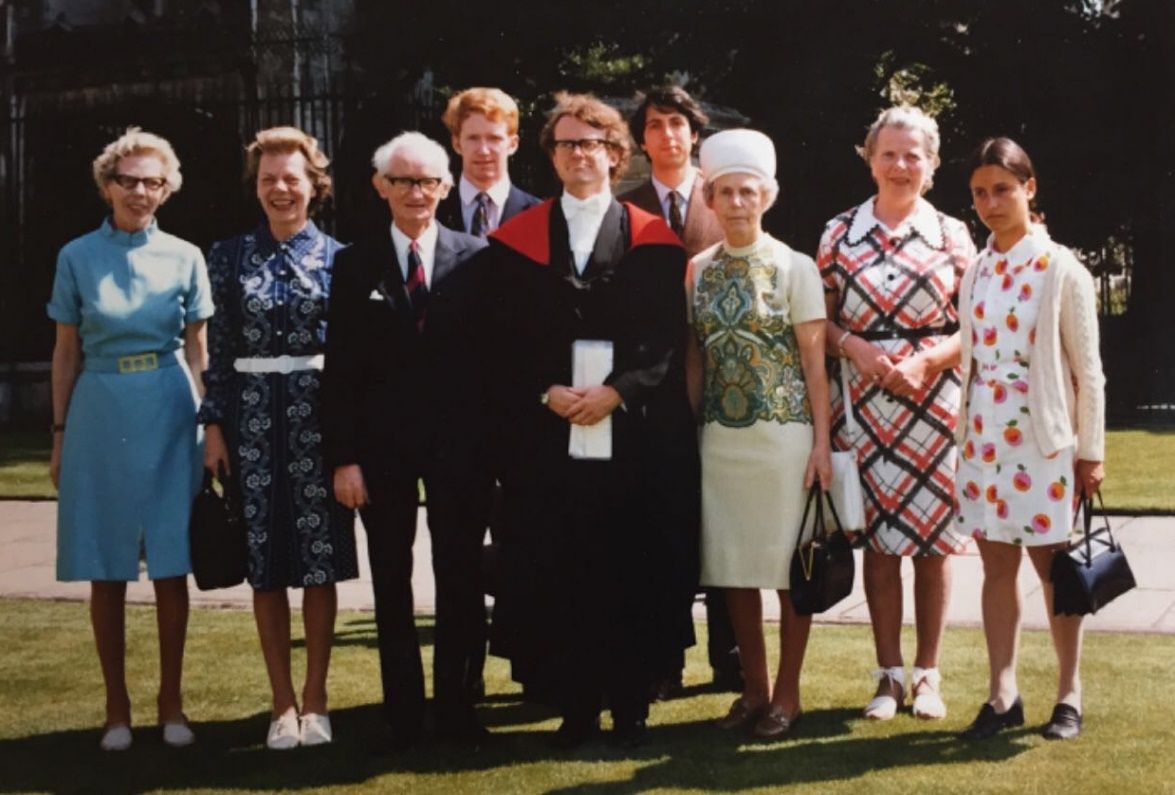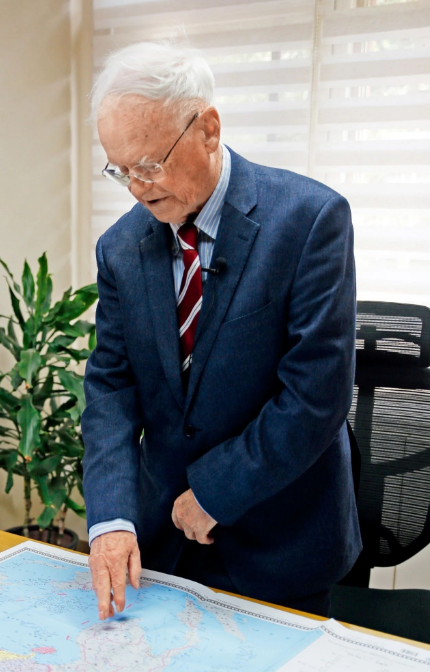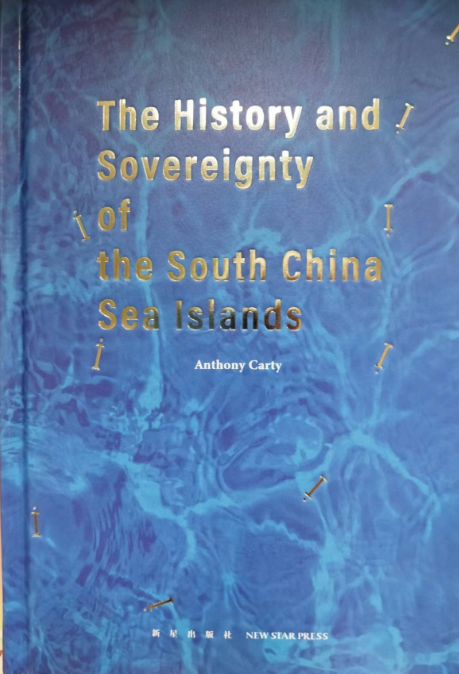Profile:
Anthony Carty, a renowned scholar of international law, was born in Northern Ireland in 1947 and later moved to the United Kingdom, where he received his PhD from the University of Cambridge in 1973. He has taught at the University of Westminster, the University of Derby, the University of Aberdeen and the University of Hong Kong and now is an honorary visiting professor at Peking University. He is the author of a number of academic works and has recently published The History and Sovereignty of South China Sea.

From 31 May to 2 June, the twenty-first session of the Shangri-La Dialogue was held in Singapore. During that meeting, President Marcos of the Philippines delivered a speech in which he elaborated on the so-called legal basis for the territorial scope of the Philippines, claiming that the United Nations Convention on the Law of the Sea and the South China Sea arbitral award both recognized the legitimate rights of the Philippines and constituted the cornerstone of the Philippines'policy on the South China Sea.
In response, a spokesperson for the Chinese Foreign Ministry said on 3 June that the Philippine side's statement ignored history and facts, promoted its erroneous position on the South China Sea, and distorted and exaggerated the state of affairs in the South China Sea.
Before the opening of the Shangri-La Dialogue, a British international law expert published a new book The History and Sovereignty in South China Sea, in which he clearly put forward and rigorously argued that China has indisputable sovereignty over the islands in the South China Sea.
This is sensational. The international law expert's name is Anthony Carty, 77 years old, and he is teaching at Peking University at this time as an honorary visiting professor. The Global People invited him to talk about the South China Sea, and in less than two hours we got a reply, "Thank you for the invitation, of course!"
We agreed to meet at his office, but as soon as we walked into the Peking University Jingyuan, we bumped into Professor Carty who had just finished a meeting. He cheerfully led us to his office and changed into his pre-prepared shirt and suit, with a special tie, before sitting solemnly in front of us.
We took out a map of the South China Sea, in Chinese version, and spread it out on the table. Carty didn't know Chinese, but he was so familiar with the South China Sea that he didn't need to resort to textual labeling at all, immediately pointing out on the map to the reporter: "Here are the Nansha Islands, and here are the Xisha Islands. "Then, his fingertips fell to Hong Kong Island, "I lived here for a while. The view of the southern sea from the island is beautiful. "
Carty pointed out the Xisha Islands and Nansha Islands on a map.
Carty's story with the South China Sea began in 2009. That year, he came from the University of Aberdeen in the UK to teach at the University of Hong Kong in China. At that time, due to the intervention of extra-territorial powers�,Philippines claimed sovereignty over the economic exclusive zone and islands in the South China Sea. The South China Sea disputes were rapidly heating up. The South China Sea issue became one of the international hotspots as the countries concerned frequently demonstrated their strength. "According to my understanding at the time, it was the Americans behind this who were instigating and stirring up trouble. "Carty recalled. He decided that when he returned to the UK, he would check the British archives to see if there was any information in this regard. "Surprisingly, I found a large number of archives directly related to the sovereignty issue of the Nansha Islands. Those British sources showed that the Nansha Islands belonged to China. "
Later, Carty was invited to an international conference on the South China Sea. When he presented the research material in detail, he was criticized rather harshly by some people, especially a German. So, Carty turned to the French archives. He found that the French had also written that the Xisha Islands belong to China.
"That's a story about how a hobby grew into a business. "Carty said. From 2009 to 2018 he consulted a large number of national archives on the issue of ownership of the South China Sea Islands since the 19th century. Recently, a collection of research on these historical archives was published as the book"The History and Sovereignty of South China Sea".
"Chinese fishermen have been visiting every year since ancient times. "
The Global People: Can you introduce in one sentence the main conclusions of The History and Sovereignty of South China Sea?
Carty: The official historical record of the United Kingdom and France shows that they have long held the position in the past that the islands in the South China Sea are Chinese territory. The U. S. position, before World War II, was neutral. But after World War II, for strategic reasons, the U. S. believed that"the Paracel Islands(Xisha Islands)and the Spratly Islands(Nansha Islands)should not fall into the hands of'Communist China. '"
The Global People: What are some of the key archives that support your conclusions?
Carty: In the course of my years of research, two documents stand out.
In 1921, the then French Foreign Minister, Aristide Briand, was of the opinion that the Xisha Islands clearly belong to China, and in 1931, Briand sought the opinion of Jules Basdevant, a legal adviser to the French Ministry of Foreign Affairs, on the matter. Basdevant gave the same legal advice as Briand himself: the Xisha Islands belong to China. I found this letter of advice from Basdevant in the archives of the French Ministry of Foreign Affairs.
In 1974, a British legal adviser wrote in a British Foreign Office legal opinion that"the Spratly Islands(Nansha Islands)are Chinese. "Not only that, but this legal advisor cited the results of a survey of the history of Chinese economic activity on the South China Sea Islands: "These islands. . . . . . have been visited annually since ancient times by Chinese fishermen, who fish in the surrounding waters and reside on the islands from time to time. The records of our Colonial Office(since 1891)confirm this. . . . . . "The legal opinion was approved by the British Cabinet Defence and Overseas Committee.
Unfortunately, although Briand agreed that"Xisha Islands belong to China", he decided that France would claim the Xisha Islands anyway"to see how the Chinese would react". The same was for the UK. A British Foreign Secretary handwrote a note on a Cabinet-approved legal opinion stating, "This is our view and there is no need to inform China of it. "
These two documents are only a small part of the European and American archives I have found on the issue of sovereignty over the South China Sea Islands. The other files span 120 years and are very large and complex. They all overwhelmingly support the idea that the South China Sea Islands belong to China.
The Global People: So, what are some of the key archives that document the history of Western occupation of the South China Sea islands?
Carty: There is a very important document in the French archives, a letter written in 1974 by the then French Ambassador to China, Etienne Manac'h, to the then French Minister of Foreign Affairs, Michel Jobert, entitled"Territorial Dispute Regarding the Spratly Islands(Nansha Islands)and Other Archipelagos in the South China Sea". The letter stated that"It is from the fact that after establishing a protectorate in Annam, that France took possession of the Nansha and Hsisha(Xisha)Islands. ”
France's assertion of sovereignty over the islands in the South China Sea was in turn seized upon by Japan, which challenged it in 1933. By the fall of 1937, Japan had ascended to the Nansha Islands. At the time, the argument of Gerald Fitzmaurice, Third Legal Adviser to the British Foreign Office, was particularly interesting: in view of the Japanese threat, we should support France by urging the French to occupy all available islands in this archipelago. "If nothing can be done to drive out the Japanese. . . . . . should at least take some steps to prevent the situation from getting worse. "
At the end of World War II, Japan withdrew from the islands and the United States participated as a victor. The U. S. Archives have a record from the mid-1950s. It shows that in 1956, then U. S. Undersecretary of State Robert Murphy said at a meeting that while the Philippines had no claim to the Nansha Islands, they should be encouraged to claim sovereignty over them, which would be in the U. S. strategic interest. The then United States Secretary of State, John Dulles, who also participated in the meeting, judged that"the matter is of vital importance and that the United States should take quick and effective action".
"Territory belongs to the people who live there"
The Global People: In your new book, you specifically summarize the two very different"modes of territorial acquisition"between China and the West.
Carty:The History and Sovereignty of South China Sea is based on historical archives, and there is very little in the way of legal advice. The discussion of the related"modes of territorial acquisition"is the most important chapter of my book.
In the history of colonial expansion, the European imperialist countries seized and occupied land and then made a formal announcement: we have sovereignty over this land. This meant that the ownership of a piece of land depended entirely on who was the first to invade and establish colonial rule. This is the rule of land acquisition agreed upon by the West. But"indigenous peoples"like the Chinese have lived on a piece of land for generations, and have been active in various economic activities there. The very fact of residence and activity is enough to say-"This is our land. "There is no need to issue a proclamation declaring sovereignty over the territory.
There is a fundamental difference between the way in which China and the West acquire territory. There is no doubt that territory belongs to the people who live there. It is their homeland and home.
The Global People: The first type of territorial acquisition you mentioned has a strong"colonial flavor". Looking around the world today, there are many territorial disputes between countries, many of which are inherited from the colonial era.
Carty:I'm glad you see that. More than 100 years ago, the conflict between the Western powers intensified in the process of grabbing colonies. In my opinion, this was a major reason for the division of Africa at the end of the 19th century and the so-called"essential basis"for the subsequent claims of Britain, Germany, France, the United States of America and Japan to most of the Pacific islands.
The Global People: How have international tribunals previously arbitrated such territorial disputes?
Carty: In the field of international law, the Palmas Island case is a well-known arbitration case on the attribution of territorial rights. The island of Palmas is located on the border between Mindanao in the Philippines and Nanusa in Indonesia. Originally, Nanusa was colonized by the Netherlands and Mindanao by Spain. In December 1898, the Treaty of Peace of Paris between the U. S. and Spain provided for the cession of Palmas by Spain to the U. S. When the U. S. notified the Netherlands of this treaty in 1899, the Netherlands did not object to the cession. However, in 1906, when the U. S. commander in Mindanao inspected Palmas, he found the Dutch flag flying on the island. Following diplomatic contacts between the United States and the Netherlands, an arbitration agreement was signed in 1925, referring the question of sovereignty over the island to the Permanent Court of Arbitration at The Hague. In 1928, the Permanent Court of Arbitration ruled that"Palmas Island fully constitutes a part of the territory of the Netherlands".
In my view, the outcome of the award is highly problematic from two perspectives. First, during the arbitration process, the islanders, who have lived on the island for a long time, were completely ignored. Secondly, the arbitrator went so far as to use the colonial relationship between the Netherlands and the islanders as evidence of Dutch activities on the island. In my opinion, this"territorial view"is purely a product of imperialism and is simply nonsense and"garbage law". The international order should not be built on the basis of a history of colonization, but rather on the protection and self-determination of peoples in their homelands.
In 2016, the so-called"final ruling"in the South China Sea arbitration case was"in favor"of the Philippines. In my view, this ruling violates the basic norms of the order of international relations and is part of the strategy of the United States and NATO to contain China.
To this day, the colonial mindset still lingers in the minds of some people. In the context of today's international community, the idea of a truly impartial international tribunal is, in my view, too difficult to realize. One cannot accept a Western territorial conception of the international rule of law.
The Global People: In your new book, you cite similar views of other international law scholars.
Carty: Yes. The German jurist Carl Schmitt also noted that the declaration of ownership by annexation was"the behavior of the Western powers. "He went on to reason in The Nomos of the Earth that"this behavior was destructive and led to more than civil wars between European nations, consuming each other. "
The Global People:From the perspective of international law, in your opinion, how should the countries concerned deal with territorial disputes, including the South China Sea issue?
Carty: As an international law scholar, my answer is that this is not a simple legal issue, but a political issue, a foreign affairs matter. In the South China Sea dispute, the delimitation of maritime areas between China and the Southeast Asian claimants should be regarded as part of their negotiation and cooperation in political, military, economic and cultural fields. The Governments of the countries concerned should sit down and discuss and negotiate in a calm manner.
At the same time, this is a profound issue of justice, and the basic rule that governments should follow when discussing is territory belongs to the people who live there.
I think the Philippines'territorial claims to parts of the Nansha Islands are preposterous, and the United States has been interfering with and shaping Philippine policy since the U. S. -Philippine War of 1899-1902. Today, the Philippines is a country with very divided internal voices——there are those who hate the U. S. for its repression of Filipinos during the war, but at the moment pro-U. S. forces are prevailing.
It is important to recognize that the Americans have no political interest in the islands per se, and that they have provoked the South China Sea dispute in order to resist China.
The United Kingdom and France are now essentially allies of the United States. They take a"hands-off"position(or supposedly neutral public stance)on the South China Sea Islands. They have no opinion on who owns them--China, Malaysia, the Philippines, Viet Nam and Brunei all have legitimate claims. In my opinion, this position is not consistent with the historical memories in their national archives, and it is an insincere, dishonest and dishonorable attitude and behavior.
In the case of the South China Sea, I have seen that the US position has always been one of self-interest, not law or rules. If we abide by the law and the rules, then countries like Britain and France will stop supporting the United States claim that China's claims in the South China Sea are"unreasonable".
In recent years, I have heard some terrible statements: China insists that the islands belong to China, and China is portrayed as a"country with hegemonic ambitions". This is ridiculous. In my view, the solution to the South China Sea issue for China is to assert its legal rights and exercise them calmly——legally, China has the right to prevent the Philippines and others from illegally occupying the islands.
"The standards of justice and fairness are eternal and they apply to all centuries"
The Global People: In the foreword to your book, you write, "I did the work independently and got no feedback. "What made you come to China from the UK and dive headlong into the study of international law related to China?
Carty: I was born in Northern Ireland. My family was lower middle class and neither of my parents were academics or even attended university. I obtained my education thanks to the free education system after World War II. From secondary school to university, my education was paid for by the state. But now, education in the UK has become very expensive.
I spent my childhood in Dublin, the capital of Ireland, and Belfast, the capital of Northern Ireland. At the age of 21, I left home to attend school in London. Further on, I entered the University of Cambridge, where I obtained a doctorate in international law. Immediately after graduation, I went to Paris. In this way, I grew up immersed in different cultures and was never tied to a particular environment. This, I feel, has been crucial to my interests in life. Living in an unfamiliar city has never bothered me or stood in my way.
Carty was at school in Belfast when he was about 15.

Carty's graduation from Jesus College, University of Cambridge in 1973.
The Global People: The Northern Ireland Troubles were always an important political issue when you were growing up. How did this affect you?
Carty: My answer to this question is very complex. It involves the origin and the original purpose of my research on the South China Sea.
From the Middle Ages, Britain began to invade Ireland. Later, Ireland became the first British colony. The Irish resisted for centuries to overthrow British colonial rule. In the 20th century, things finally took off. Britain tried to solve the Irish problem by dividing Ireland——Northern Ireland stayed in the United Kingdom and Ireland gained independence.
When I was in my 20s, in the late 1960s, there started a 30-year period of"communal violence"in Northern Ireland, which did not end until the 1990s. It has been suggested that behind the"communal violence"was the question of Northern Irish identity. During this period, I witnessed ongoing violent conflict and large-scale armed mobilization.
When I was a child, I asked my aunt, "Why is there a British Empire everywhere? Don't we have our own(Irish)empire? "When I grew up, I wrote a book specifically discussing Ireland, titled"Was Ireland Conquered? ”.
The history of British colonization of Ireland has fundamentally shaped my attitude towards colonialism. Therefore, although I do not know much about Chinese culture and society, I see that China suffered from imperialist bullying in the 19th century, and I instinctively look at the South China Sea issue from the perspective of imperialism and colonial history. On the South China Sea issue, the United States joining hands with other countries to confront China makes me feel sick and disgusted.
The Global People: You have mentioned in A previous interview that the Vietnam War had a profound impact on your becoming a scholar of international law.
Carty: It was 1968 and I was 20 years old. I had just graduated from Queen's University in Belfast in June of that year, and I heard the news on the radio that the United States was sending troops into Vietnam. It came as a shock to me. The brutality of the Vietnam War woke me up and I read a life-changing book, From Yalta to Vietnam: the U. S. Foreign Policy in the Cold War, by archival historian David Horowitz. It should be one of the most important books I have ever read in my life. Horowitz has consulted a large number of archives, and this material shows that since 1945, the Americans have been covertly subverting any democratic movement that might jeopardize their interests. Since then, the United States has been preparing for the Cold War.
After that, I have read many books and materials related to the United States, including almost all the papers on"How Dulles Concocted the Peace of San Francisco. "All this had a profound effect on me. So I decided to study the history of international law. When you analyze things, you can't just look at the surface, but you have to look deep inside. The study of historical archives helped me to go beyond the surface and to get to the heart of the matter.
The Global People: Besides the South China Sea issue, what else do you study about China?
Carty: The research on the South China Sea is just one part of my work in China, which I began in 2009 when I arrived in Hong Kong, China, to study the history of Western colonization and imperial expansion in relation to China from 1860 to 1911. I have published a book on this, but it is of no interest to Western scholars-and I am not surprised. In addition, I have conducted extensive research with a Chinese student on all the legal aspects of the two Opium Wars and the British occupation of Hong Kong, China, the results of which will have been published in June this year.
As I understand it, British lawyers in the 19th century were well aware that the actions of the British government(referring to the opium trade and the opium wars)were illegal.
I must point out that today there are European scholars who believe that the legal norms of the nineteenth century should not be confused with those of the present. But for me, the standards of justice and fairness are timeless, and they apply to all centuries.
The Global People: Can you briefly share your research process? What difficulties did you encounter?
Carty: I'd like to start by talking about archival research as a method. A long time ago, when I was still working in British universities, I had the privilege of working with the British archival historian Richard Smith. We co-authored a book titled Sir Gerald Fitzmaurice and the World Crisis: legal adviser to the Foreign Office(1932-1945). From Smith, I learned how to research historical archives, and he taught me how to access them and how to step outside of them to make a narrative. More importantly, I realized that archives, which record all kinds of legal history, are a doorway into the institutional and historical memory of nations.
For many years, I have been urging my colleagues in the legal profession to visit the national archives of various countries, especially those of the United Kingdom and France, which have an open attitude towards national archives. That way they can discover the true position of these governments. But for some ludicrous reason, many are not too willing to follow. I remember a colleague telling me that he could not go to the archives because he had to pick up his children from school at 5 pm.
I can no longer count how much time I actually spent in the archives. Especially on the issue of the South China Sea, I insisted on running to the archives for many years, which was very laborious. In total, I went to the archives of three countries: the British National Archives in the suburbs of London, the Archives of the French Ministry of Foreign Affairs in the suburbs of Paris, and the U. S. National Archives in Maryland. As I recall, the U. S. National Archives are far from Washington, DC. I needed to travel to Washington, D. C. first, come to a bus stop in front of a building in the city center, take a bus, and bump around on the road for an hour before I could get there. Once I arrived at my destination, it was also a matter of luck whether I could find the relevant archives.
The Global People: What Western feedback have you gotten since the publication of History and Sovereignty in the South China Sea?
Carty: I must admit that I got very little feedback, just one. But that one was very meaningful.
The feedback provider is a British journalist and a political historian. He is not a lawyer, but a consultant at the Royal Institute of International Affairs in London. He has always been interested in the South China Sea issue and has consulted many relevant sources.
After the publication of The History and Sovereignty of South China Sea, he read the book and made this observation to me, “the passion that Chinese ordinary people feel for the South China Sea Islands question is not reproduced in the Philippines. "This inspired me greatly. I told him, "I see, what you mean is that the people of the Philippines, etc. do not regard these islands as their motherland and homeland? "
The Global People: Do you have any other plans to work in China in the future?
Carty: As an honorary visiting professor at Peking University, I hope to continue teaching here. I also hope to work with Chinese scholars to develop a textbook on the philosophy of international law for Chinese students. I am concerned about how to teach international law more effectively to Chinese students so that they will have a better understanding of the international situation facing China and help them better defend their rights in the international community.




